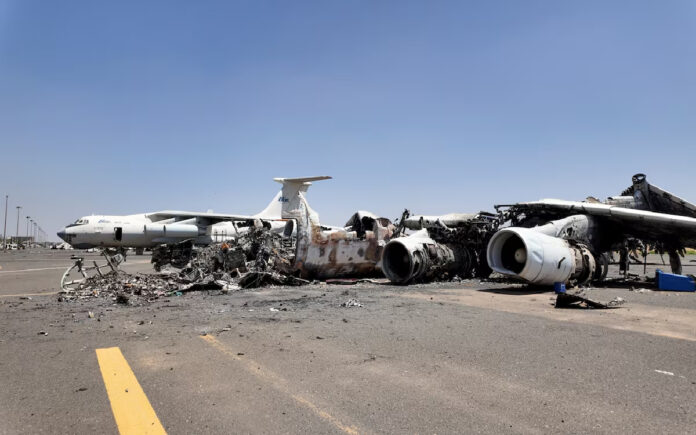Khartoum: The Sudanese army launched intense shelling on parts of Omdurman early Thursday, residents reported, as it sought to expel the remaining Rapid Support Forces (RSF) from the capital region. The offensive came a day after the army declared victory in its two-year battle against the paramilitary group for control of Khartoum.
Despite the army securing the capital, the RSF maintains a presence in Omdurman, situated across the Nile, and has fortified its stronghold in western Sudan, effectively dividing the country into rival zones.
Army Victory in Khartoum
Residents in Khartoum expressed relief after enduring prolonged conflict since the war erupted in April 2023.
“During the last two years, the RSF made our life hell, killing and stealing. They didn’t respect anybody, including women and old men,” said Ahmed Hassan, a 49-year-old teacher.
The war has devastated much of Sudan’s capital, displaced over 12 million people, and left nearly half of the country’s 50 million residents facing severe food shortages. The United Nations has labeled it the world’s worst humanitarian disaster.
Although the total death toll remains unclear, a study published last year estimated that up to 61,000 people had died in Khartoum state alone within the first 14 months of the conflict.
The ongoing war has exacerbated instability across northeastern Africa, impacting neighboring nations such as Libya, Chad, the Central African Republic, and South Sudan, all of which have experienced internal conflicts in recent years.
Continued Fighting in Darfur and Omdurman
On Thursday, Sudanese army chief Abdul Fattah al-Burhan proclaimed in a video from the recaptured presidential palace, “Khartoum is free.”
However, the RSF dismissed the army’s claims, asserting in a statement that it had “never lost a battle.” The group said its forces had “strategically repositioned and expanded across battlefronts to secure their military objectives,” without specifying locations.
While the fall of Khartoum marks a pivotal moment, the conflict is far from over. Reports from Darfur indicate that the RSF has intensified shelling on army positions in al-Fashir, the region’s main city.
RSF Retreat and Redeployment
Witnesses said RSF fighters withdrew from Khartoum on Wednesday using a Nile dam located 40 kilometers south of the city. Some regrouped in Omdurman to resist army offensives, while others retreated west toward Darfur.
The army controls most of Omdurman, where two significant military bases are located, and appears determined to secure full control over Khartoum’s metropolitan area. Thursday’s bombardment targeted the southern part of Omdurman.
Additionally, the RSF continues to control a strategic area around the Jebel Aulia dam, south of Khartoum, reportedly to facilitate the retreat of remaining fighters.
In North Kordofan state, residents observed an RSF military convoy consisting of dozens of vehicles heading west, further signaling the group’s strategic redeployment.
Also Read | Red Sea Submarine Sinks Near Hurghada, Killing Six Russians
Background and Political Implications
The Sudanese army and the RSF were once allies, having jointly orchestrated a coup in 2021 that derailed the country’s transition to civilian rule after the 2019 ousting of longtime autocrat Omar al-Bashir.
The RSF, led by Mohamed Hamdan Dagalo—commonly known as Hemedti—originated from the notorious janjaweed militias. Bashir had cultivated the group as a counterbalance to the army, which remains under the leadership of career military officer Burhan.
Under an internationally backed transition plan, the RSF was supposed to integrate into the regular army, but disputes over the timeline and process led to the outbreak of war.
In Khartoum, the RSF swiftly seized residential areas, overpowering the better-equipped army, which was confined to large military bases reliant on aerial resupply.
The army’s takeover of Khartoum could pave the way for the formation of a new government. However, the RSF has indicated that it would support the establishment of a parallel civilian administration, further deepening Sudan’s political crisis.



